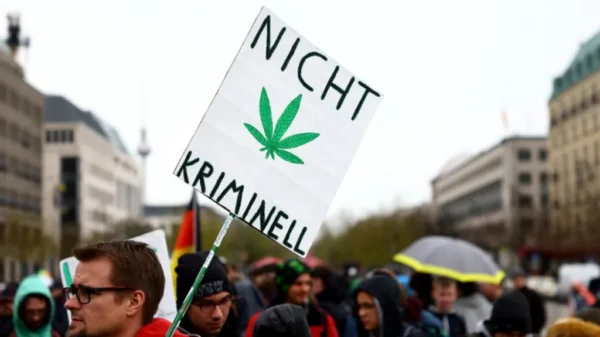Germany Legalizes Cannabis, but Implements Stringent Purchase Regulations
The German parliament has approved a groundbreaking law allowing the recreational use of cannabis, marking a significant shift in drug policy. The law permits individuals over 18 to possess substantial amounts of cannabis, but stringent regulations will make its purchase challenging. Starting April 1, smoking cannabis in many public spaces will be legal.
Under the new law, public possession of up to 25g (equivalent to dozens of strong joints) and private possession of up to 50g will be allowed. While some German police, especially in places like Berlin, have often overlooked public cannabis use, it has remained illegal for recreational purposes.
The Health Minister, Karl Lauterbach, who spearheaded the reforms, aims to curb the black market, safeguard consumers from contaminated cannabis, and disrupt revenue streams for organized crime. The rising use of cannabis among young people despite existing laws has been a concern.
However, the legalization does not mean cannabis cafes will suddenly proliferate across the country. A long-standing debate on decriminalization has divided opinions, with doctors expressing worries about potential health impacts, and conservatives fearing it may encourage drug use.
After a contentious session in the Bundestag, Germany’s parliament, the law was passed with 407 votes in favor and 226 against. Opposition conservatives criticized the move, calling it a “completely unnecessary, confused law,” disregarding warnings from various stakeholders.
The approved law is intricate, maintaining certain restrictions. Smoking cannabis near schools and sports grounds will remain illegal, and the market will be tightly regulated to impede easy access. Initial plans for licensed shops and pharmacies to sell cannabis were abandoned due to EU concerns about potential drug exports.
Instead, a unique approach will see the establishment of non-commercial “cannabis social clubs” responsible for growing and distributing limited amounts of the drug. Each club will be limited to 500 members, on-site consumption will be prohibited, and membership will be exclusive to German residents. The law also permits individuals to grow up to three marijuana plants at home.
While this allows for substantial personal possession, the restrictive purchasing framework may unintentionally fuel the black market. Regular cannabis users might benefit, but occasional users and tourists may find it challenging to access the drug legally. The government plans to assess the law’s impact over the next few years and consider introducing licensed cannabis sales. However, with the contentious nature of the debate, the future of cannabis regulation in Germany remains uncertain, and opposition conservatives have signaled their intention to repeal the law if they come into power next year.






































Comment Template